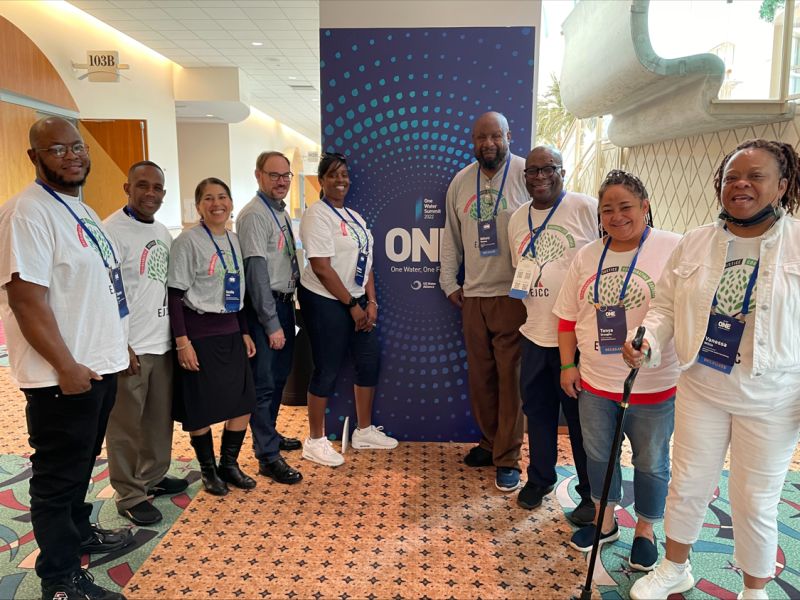
Matt Doll, Minnesota Environmental Partnership
Earlier this month, the MEP team had the opportunity to participate in the US Water Alliance’s One Water Summit in Milwaukee, where representatives from communities, utilities, and organizations from around the country met to discuss our shared interest in clean water for all.
For our team, the Summit was an opportunity to act on MEP’s values and strengthen our partnerships. MEP and its partners are working to build collective power to secure a healthy environment for all Minnesotans. MEP’s Director of Advocacy and Inclusion, Cecilia Calvo (third from left in above photo), participated as part of a delegation from the Environmental Justice Coordinating Council (EJCC), a Twin Cities initiative working for environmental and economic justice, especially in communities of color. Steve Morse attended as part of the State Revolving Fund Advocates Working Group delegation.
Key takeaways
By now, most Americans likely have some understanding that our water supplies, especially in vulnerable communities, are under threat. The state of Mississippi’s refusal to invest in its state capital city’s water systems, exacerbated by flooding, has led to Jackson residents still facing unsafe water. That crisis has drawn comparisons to the water crisis in Flint, Michigan, another predominantly Black city that suffered years of deliberate underinvestment by state government.
That kind of underinvestment will be especially harmful in the face of emerging threats like climate change and PFAS – Per- and Polyfluoroalkyl Substances. This widespread, cancer-causing class of chemicals are a major problem for Minnesota communities like Bemidji and Washington County. At the One Water Summit, Cecilia attended a panel on PFAS that touched on recent efforts to bring corporate accountability for the pollution. “I found myself feeling increasingly frustrated during this session at why the producers such as 3M and Dupont are being allowed to continue to put these dangerous chemicals into our water, essentially putting profit over human health,” said Cecilia.
For Steve and Cecilia, the other key takeaway was a closely related issue: centering community voices in major water and environmental policy decisions. As the Jackson water crisis illustrates, policymakers have a history of ignoring or bypassing community concerns for political reasons, intertwined with structural and environmental racism. A just response to climate change and environmental pollution requires listening to and learning from the communities who directly experience the effects of pollution and climate disruption where they live, work and play.
Here in Minnesota, drinking water threats like lead in water pipes, nitrate in wells, and PFAS in aquifers tend to hit hardest in communities least equipped to mitigate them. New pipes and wells are expensive ways to deal with these invisible but very real hazards, but the alternative is families drinking unsafe water.
MEP is proud of our part in the effort to mitigate these costs. In 2020, we forged new alliances and helped secure passage of more than $300 million in water infrastructure bonding for communities across Minnesota. The federal bipartisan infrastructure law passed in 2021 will also make a big dent in these costs for communities – as long as the state ensures the money reaches its destination and matches federal funds so that water upgrades are affordable for all.
But on a more fundamental level, we need to listen to communities who are most directly impacted by environmental harm and ensure these communities have a voice in developing the solutions to protect the future of their drinking water. The EJCC, for example, met with Minnesota Pollution Control Agency Commissioner Katrina Kessler at the One Water Summit. Members hope to build on that relationship and others like it to ensure that agency decisions aren’t imposed on communities from the top down, but include real dialogue, input from communities and openness to change every step of the way.
Well owners in rural Minnesota, families suffering from PFAS in the west Metro, and residents of Jackson, Mississippi didn’t have a say in whether their water supplies would be contaminated, but their stories will help create the solutions.
For previous columns, visit mepartnership.org/category/blog/. If you would like to reblog or republish this column, you may do so for free – simply contact the author at matthew@mepartnership.org.